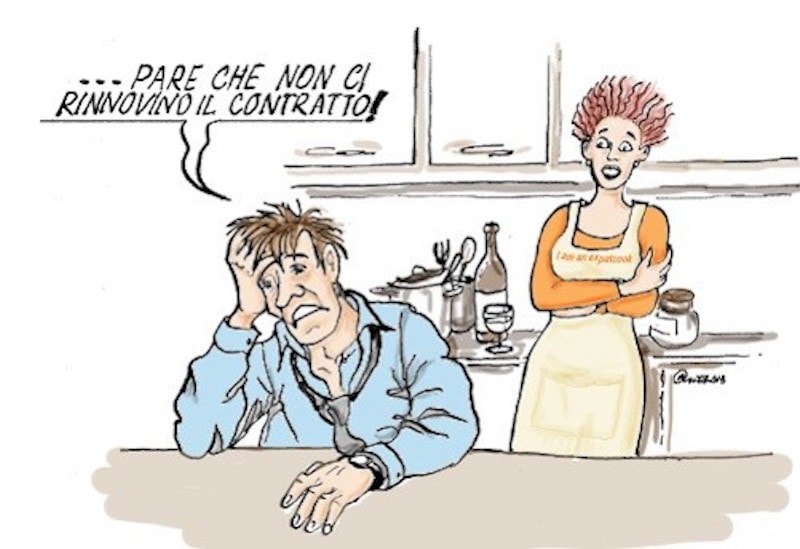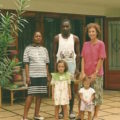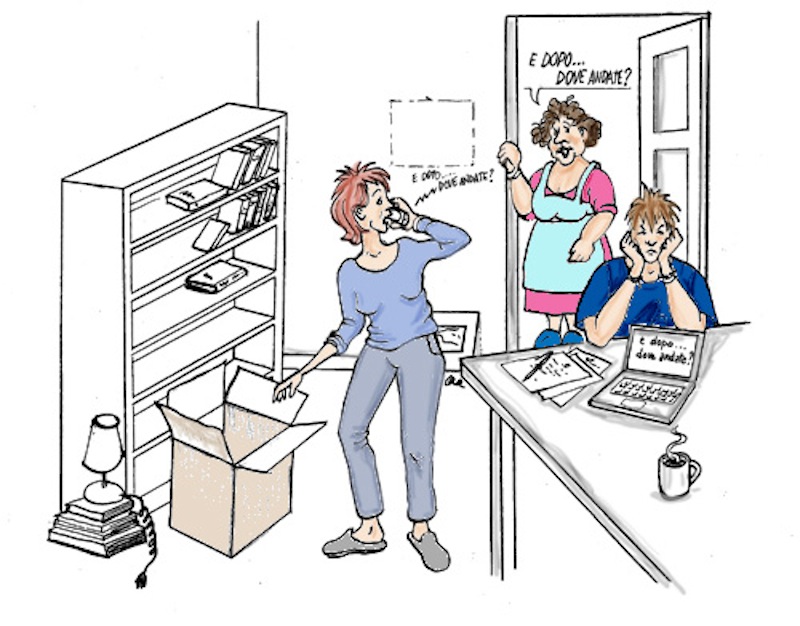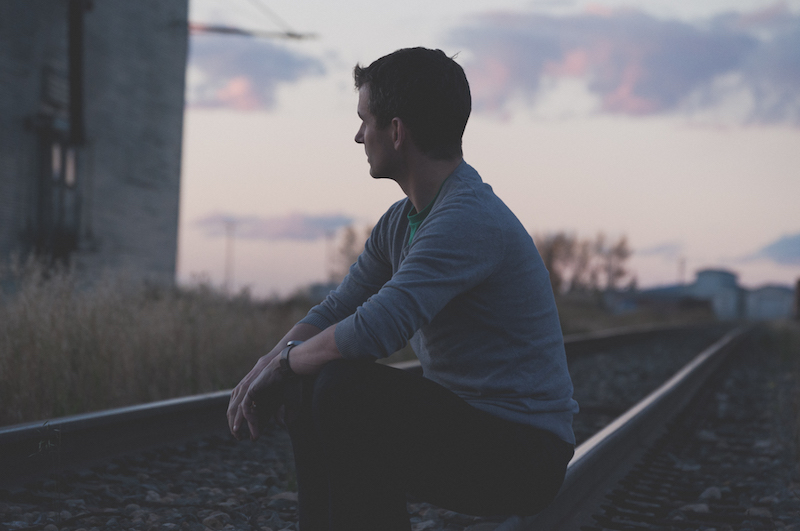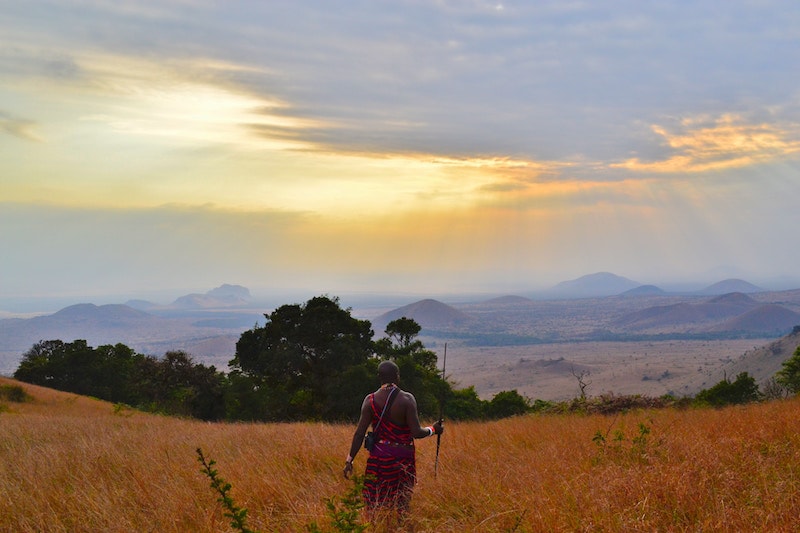
This is the amazing story of a German woman who fell in love with a Masai man in Tanzania, and decided to stay on in his village and live her life with him. With this beatiful interview, Stephanie opens a door for us on a way of life we know very little about, and shares her feelings and challenges but mostly her love for the man she has married, and the beautiful land he comes from. Thank you Stephanie, from the bottom of our hearts.
Stephanie, can you tell us a bit about you: where you were born and what is your background of studies and work?
I was born in Frankfurt, Germany in June 1986, raised by a single Mum who had come to Germany from France when she was only 19 years old. Incidentally I also moved away from home when I was just 19. I went traveling around Australia and then went to England to study Biology and Conservation at Bath Spa University. During that period I spent two months in Zimbabwe to do research for my dissertation on human-animal conflict. It was at that time that I fell in love with Africa and promised myself I would be back soon. After graduation I came to Tanzania as a volunteer for a London based Conservation NGO. I worked for a year close to the Selous Game Reserve where we focused on establishing migration corridors for large mammals. Then I moved to Mafia Island, south of the famous Zanzibar, still working for the same organization and now working in a Marine Protected Area doing fish censuses. It was there where I met my husband 😊
You have done something which is not very common: you have married a Masai and moved to live in his country. Can you share how this all happened? Where did you meet him, and when did you decide to join lives and to live with him?
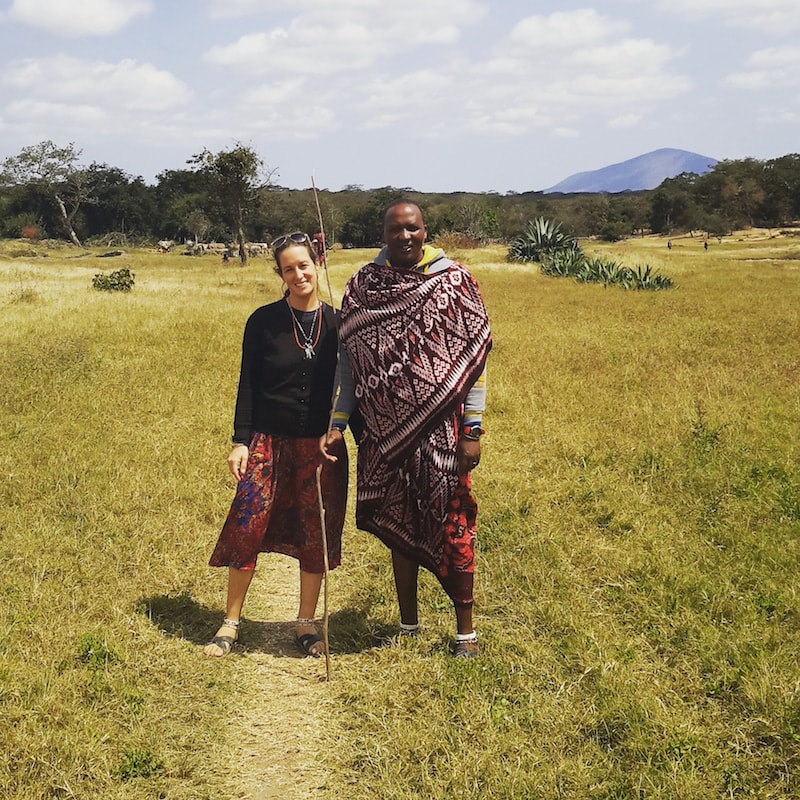 I met my husband Sokoine while working on Mafia Island. We lived in a small village inside the Marine Park and Sokoine worked as security for a dive centre. I met him on my first day on the island while strolling through the village and I was taken by him straight away. It was his eyes that attracted me – I remember that as if it was yesterday. I spoke a little Swahili then and tried to keep him there on the road where I had bumped into him and some friends. But during the first weeks, Sokoine and the other Masai were reserved towards us, friendly and always smiling, but preferred to stay by themselves. There was one day however when a friend of mine, a local, told me that Sokoine liked me. I, of course was overwhelmed and could not believe it! Someone so beautiful and exotic, likes me?! That day, Sokoine and I talked properly, openly for the first time and things went from there. A week later, we got together but by that time, I had only 3 weeks left on my contract. I knew I had to leave, but I did not want to. I had known even before I met Sokoine that I wanted to stay in Tanzania. So I planned to go to Dar es Salaam and look for a job. At the same time, I knew that I wanted to stay with Sokoine. He was also leaving Mafia to go home, on his annual leave.
I met my husband Sokoine while working on Mafia Island. We lived in a small village inside the Marine Park and Sokoine worked as security for a dive centre. I met him on my first day on the island while strolling through the village and I was taken by him straight away. It was his eyes that attracted me – I remember that as if it was yesterday. I spoke a little Swahili then and tried to keep him there on the road where I had bumped into him and some friends. But during the first weeks, Sokoine and the other Masai were reserved towards us, friendly and always smiling, but preferred to stay by themselves. There was one day however when a friend of mine, a local, told me that Sokoine liked me. I, of course was overwhelmed and could not believe it! Someone so beautiful and exotic, likes me?! That day, Sokoine and I talked properly, openly for the first time and things went from there. A week later, we got together but by that time, I had only 3 weeks left on my contract. I knew I had to leave, but I did not want to. I had known even before I met Sokoine that I wanted to stay in Tanzania. So I planned to go to Dar es Salaam and look for a job. At the same time, I knew that I wanted to stay with Sokoine. He was also leaving Mafia to go home, on his annual leave.
I fell in love with their culture and the way they lived their lives, close to nature and their animals.
We made plans to meet up when he was in Dar and then at some point I would visit him at his home to meet his family. I did so a couple of months after leaving Mafia, in May 2011. And in June, because I did not want us to be apart, I went back to Mafia Island with Sokoine, where he had to continue working to support his family. I was very lucky to get my old job back. We lived together like this on beautiful Mafia Island, for 5 months and then I had to go home to Germany for a while. In January 2012 I came back and it was then that Sokoine and I decided to move to his family’s home in the Masai Steppe. I would support his family and we would live a traditional Masai life, living off the land and off our cattle 😊.
How did people around you (family, friends…) reacted when you decided to go and live with the love of your life?
What was left of my family at that point (my brother and my sister) were not very enthusiastic about it at first. They were a bit worried, I think. They had both never met Sokoine and never been to Africa and had some misconceptions about it. My close friends from England and Germany were a bit more open about it and one actually came out for our traditional Masai wedding in April 2012. Today, though, all my friends and family love the way I live my life and all of those who have been to visit me here are so humbled by the kindness and generosity of the Masai that they support us in any way possible and often come back more than once.
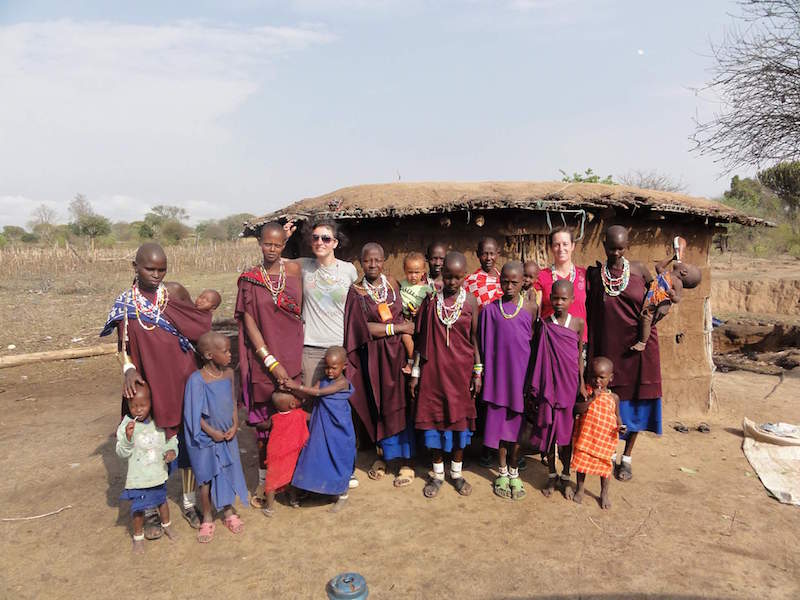
All the women in my family, myself (back right in red) and the girlfriend of a friend, they both came to stay in January as part of my cultural tour business.
How did it feel at the beginning? Main challenges and biggest sources of happiness? How did you integrate in such a different culture from the Western one where you come from?
It was difficult at first finding my feet living with his family. I did not know the language and they only speak basic Swahili. There are so many aspects and customs to the Masai culture and some of them were difficult to get used to. Like bowing your head when greeting older people when you have to guess everyone’s age and never being able to be alone with your husband who, as a warrior, is not allowed to eat without other warriors. I often felt lonely and misunderstood. I felt insecure in our relationship because of the strain adapting to Masai life was putting on my happiness. There were many tears, but I was determined to make it and told Sokoine so when he asked me if I will be happy here. He was amazing. He guided, encouraged and supported me, often leaving his traditions behind for the sake of my well being.
…honestly, if there ever was a time when I missed something, I cannot remember.
Often he was stern with me, telling me to get a grip, but I realise now that I would not have made it, if it had not been for the way he guided me through it. What kept me sane was his lovely family. I fell in love with their culture and the way they lived their lives, close to nature and their animals. They were so welcoming and tolerant towards me. Taking me in with no questions asked. They put Masai jewellery on me and dressed me in their clothes. I think they were trying to turn me into one of them right from the start. They made sure they provided me with all the basic comforts they could give me, like hot water for showering, extra blankets to cushion their hard beds, cooking for me, taking me on walks. Basically looking after me as well as you would after a small child. Well I guess, I was a small child to their world and they really tried their hardest to make the transition easier for me.
Is there anything you miss from your home country and anything you find really hard in living in Tanzania?
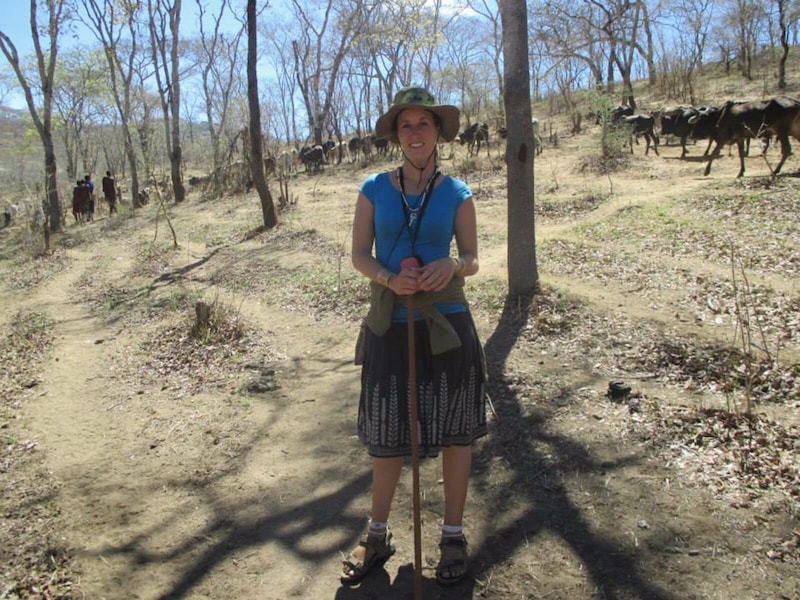 I think this is one of the most common questions people ask me about my life here. And honestly, if there ever was a time when I missed something, I cannot remember. I do remember though feeling awkward during my first few months in Tanzania. It is just that wherever you go, the attention is on you – you are white, you stick out and people call you ‘Mzungu’, the term they use for foreigners here. At first you think they are being offensive, but they really are not. They are just curious and especially in rural Africa, the sight of a white person is so rare, that it makes for a big event. I used to not like it sometimes, but as with so many other things you get used to it. And when you respond with a smile – you get a smile back! Here in my Masai home, the lack of electricity, running water and other First World luxuries does not bother me. I have everything I need. Sometimes, when I am not well, especially when I have malaria (I have had it now five or six times) I do fancy pizza and a nice cold glass of fruit juice, but when I am healthy, I am fine with just eating rice and vegetables every day.
I think this is one of the most common questions people ask me about my life here. And honestly, if there ever was a time when I missed something, I cannot remember. I do remember though feeling awkward during my first few months in Tanzania. It is just that wherever you go, the attention is on you – you are white, you stick out and people call you ‘Mzungu’, the term they use for foreigners here. At first you think they are being offensive, but they really are not. They are just curious and especially in rural Africa, the sight of a white person is so rare, that it makes for a big event. I used to not like it sometimes, but as with so many other things you get used to it. And when you respond with a smile – you get a smile back! Here in my Masai home, the lack of electricity, running water and other First World luxuries does not bother me. I have everything I need. Sometimes, when I am not well, especially when I have malaria (I have had it now five or six times) I do fancy pizza and a nice cold glass of fruit juice, but when I am healthy, I am fine with just eating rice and vegetables every day.
I am living each day the way I want to live it, doing what I feel like doing.
The thing is, here in Africa, even out here in the middle of nowhere, you can get most things that you find in the Western world too – you just have to go a little further and work a little harder to get it. I have a solar panel providing me with electricity, we have a rain water tank providing us with water. We have a village nearby where I can buy vegetables and even fruit. You walk for one hour to get there, but that is good for you. And if you do not feel like walking you get a motorbike taxi. We have our own, so it makes everything a lot easier. Sometimes I miss my friends and family or miss sitting in a garden on a warm European summer’s day drinking a cold glass of wine, but most days I am just happy and grateful to be where I am. I am living each day the way I want to live it, doing what I feel like doing. I have no stress, no bills to pay, no job to get to at 8 in the morning. I wake up everyday surrounded by nature, by the laughter of children and the noises of our animals. I am free to roam wherever I feel like going. I get on really well with my mother-in-law whose kindness and wisdom have made her one of my best friends.
It is these challenges that really have made me love Africa, because it has the capacity to just slap you in the face and tell you ‘No, it is not that easy, I will make you work for this.’ It opens your eyes and teaches you to not take things for granted, to stop being so spoilt.
What bothers me sometimes is the difficulties getting from one place to the other during the rainy season. To get to our village, you have to navigate a 100 km stretch of dirt road, which turns to mud during the rains and there have been many times when we abandoned the bus and started walking and did not get home till late at night. But these are the adventures that make you stronger, that lift your spirit and keep you on your toes, both mentally and physically. It is these challenges that really have made me love Africa, because it has the capacity to just slap you in the face and tell you ‘No, it is not that easy, I will make you work for this.’ It opens your eyes and teaches you to not take things for granted, to stop being so spoilt.
What are the biggest cultural challenges in relating to your husband and his family?
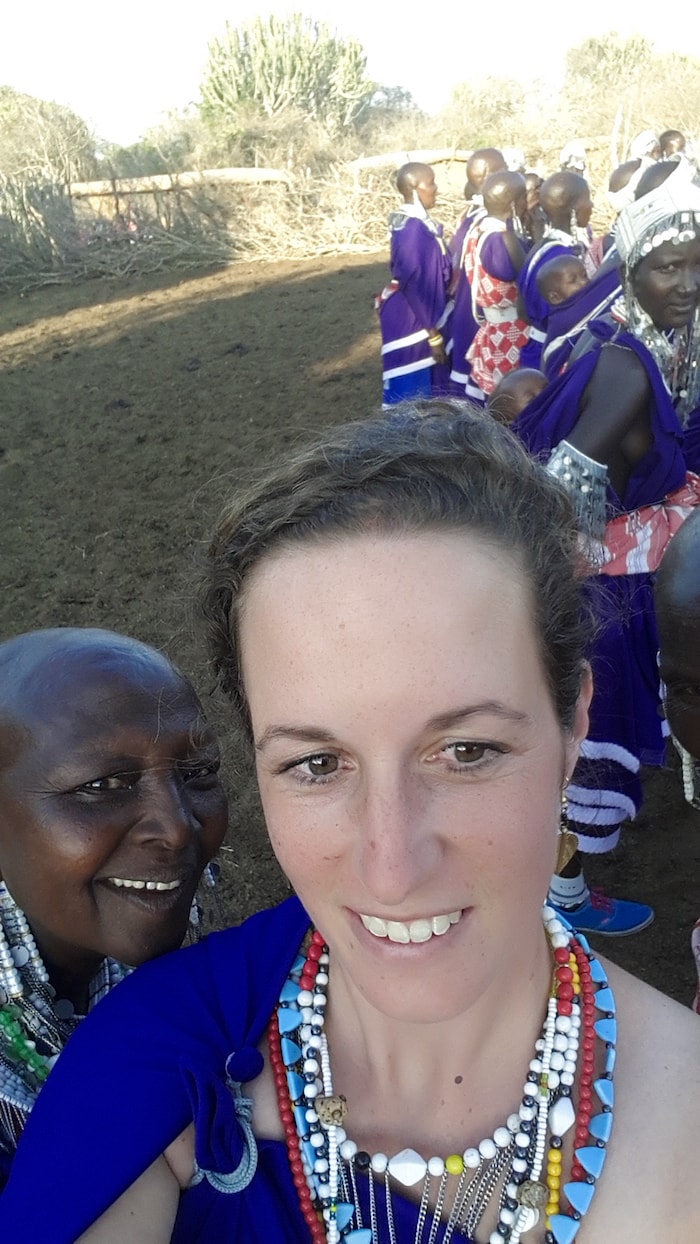
Me and my mother-in-law
There used to be many things that bothered me or even upset me when I first came, but now I feel that many of those things were very small and trivial and that I was a bit silly getting annoyed. One big thing that was difficult at first, was never being able to have alone time with my husband. He is always surrounded by other warriors, often right until the minute we go to sleep. It used to bother me – it does not anymore. I love that we share everything with his family and that our house is always open to his siblings, friends and neighbours. It was also hard to accept that my husband, being a warrior, would not play a big part in raising our son who is now two. The first few months after birth were some of the hardest of my life but as with the most difficult things in life, they also taught me some valuable lessons. As with all cultures, the Masai also have certain taboos and behaviours that are strange to the average Westerner, but you get to know and accept them. Sometimes I wish I could talk more openly about my feelings, my dreams and desires to my husband’s family but I know that they would not be able to understand me the way I would want them to, so I leave it. There are still moments when I feel utterly alone and misunderstood, but these moments pass and often have more do to with myself than with the beautiful people I am surrounded by. It comes down to this really and I guess this is true for everyone, no matter where you are in the world: if your heart and mind are in it, you will try your very best to make it work. If they aren’t, you will find out the day you chose to give up trying.
Would you like to tell us briefly about your activity as a tour operator?
I have been supporting my husband’s family for over six years now – without a regular income, this has taken its toll on my finances. I had to come up with a way of earning an income without having to make investments. So I decided to open our doors to an international audience, to invite people to come stay at our home and experience the Masai’s fascinating culture. I created a Cultural Tourism website and also started writing a blog about my experiences of living with the Masai.
It was my son, who was born into his father’s culture, who inspired me to do so. To preserve the beautiful wild land we live in so that he may grow up true to his Masai roots and in harmony with nature.
We have had a handful of guests and they absolutely loved the experience. There are a lot of tour operators, offering visits to Masai homes, but these visits are often staged, taking place in fake bomas and not a lot of the funds go back to the communities. With us, the experience is authentic and unique, giving guests the opportunity to play an active part in the Masai’s daily routines and we offer stays of several days for an ultimate cultural insight. I am using the funds to feed our large family and should this business become really successful, I will invest some of the money back into our community to protect the Masai’s unique cultural heritage and the wilderness they depend on to feed their cattle.
And now the most important question, the one I really have at heart: why did you launch the Stephanie’s Masai Education Fund, and can you tell us anything that is not already explained in the beautiful fundraising campaign page you created with Indiegogo?
I launched my Masai Education Fund, which has reached its deadline on 15th February, out of love for the Masai and fed by my passion for conservation. With it, I hope to protect both the Masai’s culture and the environment they live in. It was my son, who was born into his father’s culture, who inspired me to do so. To preserve the beautiful wild land we live in so that he may grow up true to his Masai roots and in harmony with nature.

The Masai are such beautiful people, both inside and outside, yet they struggle to grasp their own worth. They struggle to find their place in an increasingly modern and over-populated world and are starting to disregard their beautiful ancient culture.
Tanzania has one of the worst education systems in Africa and this is evident in the lack of understanding the Masai have about how they are so intricately connected to the wilderness they live in.
It is on the fact that everything is connected that my project is based: the Masai depend on their cattle as an income, the cattle themselves depend on a healthy ecosystem to find enough grazing lands and this ecosystem needs to be looked after by its inhabitants – the Masai, to stay intact. If one manages to improve just one of those three aspects, it will have a positive impact on the other two.
I aim to provide funds for our community to be educated in land management and conservation so that we may work together to protect and regenerate our range lands, which are suffering from unsustainable agriculture practices and deforestation.
It will take years to provoke change and to see some results and I will be here to support and encourage them and to keep digging for those much needed funds.
There are many community owned concessions in Kenya, many ran by Masai or Samburu, which have an abundance of wildlife sharing its space with the tribes’ cattle and this is what I hope to create here. I believe it is possible for the Masai to once again be guardians over their land – I am just giving them a little push to start this effort.
This will be an ongoing project – we may have reached our deadline, but I can already tell you, that it will not be the last. With the funds I have raised now we will be able to start our education, but we will need to raise further funds to implement what we have learned and to take a second, longer, more in-depth course.
It will take years to provoke change and to see some results and I will be here to support and encourage them and to keep digging for those much needed funds.
You can read more about my campaign on its Indiegogo crowdfunding page and find links and updates on my blog and on my Instagram and Facebook accounts.
Stephanie Fuchs
Tanzania
February 2018
Interview collected by Claudiaexpat
All photos ©Stephanie Fuchs except the head one by Sho-Hatakeyama

